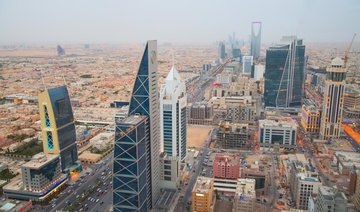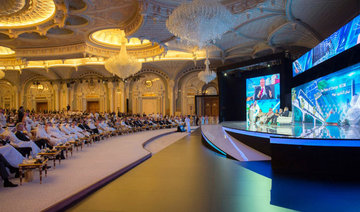RIYADH: A virtual reality show illustrating what the soon-to-be-constructed Neom city will look like drew big crowds at the Future Investment Initiative in Riyadh yesterday.
Plans for the $500 billion mega city and business zone on the Red Sea were unveiled on Tuesday by Saudi Crown Prince Mohammed bin Salman.
Neom will be one of the biggest projects of its kind and will be powered by renewable energy such as solar and wind, be drone-friendly and a center for new technologies including research into areas such as artificial intelligence.
The demonstration at the forum highlighted Neom’s potential and offered delegates a glimpse of the future, with robots on hand to answer questions from curious and sometimes amused delegates.
People were taken into an enclave at half-hour intervals for a guided tour that lasted 15 minutes. The show started with a panoramic video of the project and displayed dazzling examples of what a 21st century smart city might look like. Neom will focus on industries including energy and water, biotechnology, food, advanced manufacturing and entertainment, the crown prince said won Tuesday.
“The focus on these sectors will stimulate economic growth and diversification by nurturing international innovation and manufacturing, to drive local industry, job creation, and GDP growth in the Kingdom,” he said. Neom will attract private as well as public investments and partnerships.
The zone will be financially supported by KSA, the Saudi Public Investment Fund, and local and international investors.
The business and industrial city will be located in the Kingdom’s northwestern region and is the world’s first zone to extend across three countries, stretching its borders into neighboring Jordan and Egypt. It will be adjacent to the Red Sea and the Gulf of Aqaba, and near maritime trade routes that use the Suez Canal.
Inside the main forum, meanwhile, panel discussions looked at themes such as: “How is the next generation reshaping business, culture, investment, and society?”
Delegates heard that in many countries, people under the age of 30 represented the largest demographic — and the central economic force of the future.
“Tidal waves of young people were entering the job market and creating significant challenges and even greater opportunities,” said one panelist. Speakers discussed ways of coping with the huge demands on societies, both economic and political, that are certain to arise in the years ahead.
‘Virtual’ Neom wows Future Investment Initiative delegates
‘Virtual’ Neom wows Future Investment Initiative delegates

Linguistic code-switching new norm for young Saudis

- Expert tells Arab News that ‘multi-dimensional issue’ deserves recognition
RIYADH: In Saudi Arabia’s increasingly globalized society, especially among young people in major cities, there is an easy blending of languages, often switching between Arabic and English in the same conversation.
This phenomenon, known as code-switching, has become a linguistic norm that reflects shifting social dynamics, culture and identity.
A 2024 study conducted by Kais Sultan Mousa Alowidha at Jouf University found that bilingual Saudis often switch between Arabic and English depending on the context, particularly in casual or professional settings.

Saudi students who have studied or grown up abroad find themselves flipping between languages almost unconsciously.
Abdullah Almuayyad, a Saudi senior at the University of Washington, Seattle, who has spent more than half his life in the US, spoke to Arab News about his experiences with both languages.
“Comfort really depends on context,” he said. “Day-to-day I’m equally at ease in either language, but the setting matters.”
HIGHLIGHTS
• The King Salman Global Academy for Arabic Language in Riyadh has launched several initiatives to strengthen Arabic fluency, both for native speakers and non-native learners.
• A 2024 study from Jouf University found that bilingual Saudis often switch between Arabic and English depending on the context, particularly in casual or professional settings.
In business settings, he defaults to English because of his education and professional exposure, but casual or family settings feel more natural in Arabic.
“Sometimes my friends tease me because I’ll begin a sentence in Arabic, hit a complex business concept, and flip to English mid-stream.”
This mental switching, he explained, is often tied to topic-specific language associations.
Some topics are assigned to a specific language in his brain. “Once the topic surfaces, the corresponding language follows automatically.”
At an institutional level, efforts to preserve and promote Arabic are gaining traction in Saudi Arabia.
The King Salman Global Academy for Arabic Language in Riyadh has launched several initiatives to strengthen Arabic fluency, both for native speakers and non-native learners.
Through academic partnerships, digital tools, and training programs, the academy is playing a key role in ensuring Arabic remains a vibrant and accessible language.
The institute reflects a broader national push to reinforce cultural identity amid the linguistic shifts brought on by globalization.
Majd Tohme, senior linguist at SURV Linguistics in Riyadh, told Arab News that code-switching is “a very multi-dimensional issue.”
He emphasized that the debate should not hinge on whether code-switching is good or bad.
“What we need to ask ourselves is, does code-switching work in the everyday context? And if it works, isn’t that the purpose of any linguistic pattern?”
He added that language purism might miss the point entirely.
“You don’t have to get involved in that language puritanism … and code-switching is not really something new. Languages are living organisms that evolve,” he explained.
Many words we consider native today, he noted, have foreign origins, such as from Persian or European languages, particularly in science and technology.
Still, there are concerns about the erosion of Arabic. Tohme acknowledged the threat but said it is not exclusive to Arabic.
“It is a threat to all languages,” he said, especially in the era of globalized communication where the internet has become a shared space dominated by English.
“You now have one internet that the world is sharing,” he explained. “It’s like one huge playground where you have 8 billion people trying to communicate with each other.”
And yet, there are signs of balance.
Almuayyad, for instance, actively challenges himself and his peers to preserve Arabic fluency.
“In eighth grade, even though my friends and I preferred English, we agreed to speak only Arabic until it felt natural,” he said. “Later, when my Arabic caught up, I switched and spoke only English with friends who wanted practice.”
For many, especially in Saudi Arabia’s larger cities, bilingualism no longer means choosing between one language over the other.
The constant nudge to challenge each other keeps both languages active and growing.
The Jouf University study found that bilingual Saudis strongly identify with both languages and do not believe that speaking English negates their cultural identity.
It also concluded that code-switching is often required in larger cities due to the abundance of non-Arabic speakers in public and professional environments.
Therefore, code-switching, especially in the Kingdom, appears to be less about identity loss and more about functionality.
As Saudi Arabia opens up globally and embraces multiculturalism under Vision 2030, this blending of languages could be seen not as a dilution of heritage, but a reflection of its outward-looking generation.
According to Tohme, the psychological impact of going abroad for a few years then returning to your home country also cannot be understated.
Students develop a certain nostalgia for home while spending so many years abroad speaking extensively in a foreign language. They may develop the determination to make a conscious effort to strengthen their Arabic-language skills again.
Almuayyad is someone who can relate to that and says if he had spent his whole life in the Kingdom, his language development might not have been that different.
“I see a lot of people in Saudi who use English freely because global media and online content are so dominant,” he explained.
Yet, he admits that growing up in one place can limit the push to step outside of your linguistic comfort zone. “My exposure to two cultures forced me to practice that stretch constantly.”
Saudi deputy FM meets European Commissioner in Brussels

- The two sides discussed ways to enhance cooperation in various fields and other topics of common interest
BRUSSELS: Saudi Deputy Minister of Foreign Affairs Waleed Elkhereiji met European Commissioner for the Mediterranean Dubravka Suica in Brussels on Tuesday.
The two sides discussed ways to enhance cooperation in various fields and other topics of common interest, the Foreign Ministry said on X.
Haifa Al-Jadea, head of the Kingdom’s mission to the EU, was among the officials in attendance.
Saudi Arabia satisfied with Syrian measures to achieve stability after clashes

- Kingdom condemned continued Israeli attacks on Syrian territory, interference in its internal affairs, and the destabilization of its security and stability
RIYADH: Saudi Arabia expressed its satisfaction with measures taken by the Syrian government to achieve security and stability, maintain civil peace, and achieve sovereignty over all Syrian territory on Tuesday.
The Kingdom also condemned continued Israeli attacks on Syrian territory, interference in its internal affairs, and the destabilization of its security and stability, in flagrant violation of international law and the Syria-Israel Disengagement Agreement signed in 1974.
The condemnation comes after Israel launched strikes on Tuesday against Syrian government forces in the Druze-majority region of Sweida, saying it was acting to protect the religious minority.
Damascus had deployed troops to Sweida after clashes between Druze fighters and Bedouin tribes killed more than 100 people.
Israel announced its strikes shortly after Syria’s defense minister declared a ceasefire in Sweida city, with government forces having entered the city in the morning.
The Kingdom renewed its call on the international community to stand by Syria, support it during this stage, and confront ongoing Israeli attacks and violations against Syria, Saudi Press Agency reported.
KSrelief distributes food baskets to displaced people in Lebanon, Sudan and Afghanistan

- The aid agency distributed 120 food baskets to Afghan refugees who returned from Pakistan and settled in Omari camp near the Torkham border crossing
- Over the past decade, KSrelief has run thousands of humanitarian initiatives in nearly 92 countries
RIYADH: The Saudi aid agency KSrelief has distributed hundreds of food baskets to families in need in Sudan, Lebanon, and Afghanistan as part of ongoing efforts to alleviate the food security crisis in various countries.
KSrelief announced that 4,250 individuals will benefit from 700 food baskets distributed to displaced families affected by the armed conflict in Sudan, specifically in Al-Kamalin district of Gezira state.
In Afghanistan, the aid agency distributed 120 food baskets to Afghan refugees who returned from Pakistan and settled in Omari camp near the Torkham border crossing. At least 720 Afghans benefited from food baskets as part of a dedicated security and emergency project in Afghanistan for the 2025-2026 period.
Approximately 2,785 displaced Syrians living in Lebanon have received 577 food baskets from KSrelief volunteers in the western Beqaa Valley. This initiative is part of a project aimed at distributing food aid to support the most needy families in Lebanon, which has been significantly impacted by drought this summer.
Over the past decade, KSrelief has run thousands of humanitarian initiatives in 92 countries. Since its establishment in 2015, the aid agency has distributed food baskets to numerous countries, including Somalia, Mali, Bangladesh, Libya, and Palestine, among others.
Diriyah Dates Season celebrates sector’s growth and heritage

- Governor praises initiatives as exports hit $453m, production tops 1.9m tonnes
- Ministry of Culture is also represented with a booth showcasing artisans specializing in palm-based crafts as part of the Year of Handicrafts
RIYADH: Diriyah Gov. Prince Fahd bin Saad bin Abdullah has praised the Ministry of Environment, Water and Agriculture for developing the date production sector in the Kingdom and enhancing the quality of dates as a national product.
He highlighted the ministry’s support programs for farmers and initiatives that add value to dates, aligning with Vision 2030 goals, the Saudi Press Agency reported.
His remarks came during the inauguration of the Diriyah Dates Season and accompanying exhibition, which runs until July 24.
The event, organized by the National Center for Palms and Dates, aims to boost the sale of Saudi dates locally and globally, and provide an insight into Diriyah’s heritage through cultural and social activities.
The exhibition features booths for date vendors, processed date products, palm by-products and items from family-run cottage industries. It also has restaurants, cafes, food trucks, workshops for adults and children, a date auction zone and a horse parade.
The Ministry of Culture is also represented with a booth showcasing artisans specializing in palm-based crafts as part of the Year of Handicrafts.
The Kingdom’s palm and date sector is growing rapidly. According to figures from the General Authority for Statistics production surpassed 1.9 million tonnes in 2024, with SR1.7 billion ($453 million) worth of dates exported to 133 countries, up significantly from the previous year.
This growth reflects the Kingdom’s strong production capacity and government efforts to improve quality, expand global outreach and develop supply chains.























